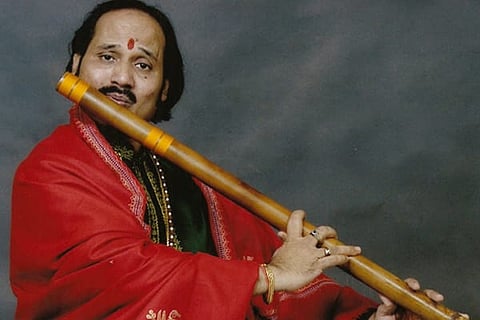Flutist Pandit Ronu Majumdar on next-gen musicians and more
Indian flutist Ranendranath Majumdar, popularly known as Pandit Ronu Majumdar, has contributed significantly to classical and fusion music. Besides his jugalbandis with leading instrumentalists, he is known for popularising the Indian bansuri among the younger generation. He recently performed at the Ustad Bade Ghulam Ali Khan National Festival of Music and Dance. The Hyderabad concert was his first jugalbandi with his son and disciple, the young maestro Hrishikesh Majumdar. We had a detailed chat with him on the sidelines of the concert. Excerpts:
What are you currently working on?
Apart from my busy schedule in India, I am currently working on my upcoming album, which will introduce a fresh sound to my audience. I am also excited to present Flute Symphony: A Tribute to Mozart at the Nita Mukesh Ambani Cultural Centre on January 17, 2025. This piece has never been performed on the Indian flute before, and I cannot wait to share this unique experience with the audience.
You perform across the globe; how do people accept/react to Indian classical music?
So far, my experience of performing outside India has been great. I have found that audiences from non-Indian communities can connect with Indian music deeply because of its spiritual calmness. Taking a cue from their level of interest, I often try to share the rich ancient history of Indian classical music with them, which resonates not only with Indians but also with international audiences.
Any person trying to learn an Indian musical instrument, is the flute the right one to start with, What kind of precautions may one need to follow?
Indian classical music is a great fine art, and to begin your journey with Indian musical instruments, it is important to learn the basics through vocal music. Vocal training can help you understand the fundamentals of Indian music, which will serve as a foundation for learning any musical instrument.
On the other hand, students pursuing the Indian flute, or bansuri should take care of their lung capacity. I advise them to regularly practice breathing exercises, such as yoga and pranayam, as these are beneficial for developing the necessary breath control for playing the flute.
What's your take on the new generation musicians? How're they coping?
The new generation has a lot of talent, but what worries me is that they are trying to achieve success through shortcuts. Most young musicians are neither dedicated to the subject nor taking the time to truly learn the craft. They are more focused on using the existing technology to upload their music on social media in hopes of gaining instant popularity. My only advice to youngsters is to invest time in learning and mastering the craft before chasing after success.
Since you've played in Bollywood, what's your stance on today's Bollywood music?
I have had the privilege of playing during the Golden Era of music, where I played the flute in some memorable compositions, such as Esa Samaa Naa Hota from the film Zameen Aasmaan, Kuch Naa Kaho from 1942: A Love Story, and a few recent songs. While some new songs are good, I miss the pure acoustic instruments that shaped earlier music. The melodies back then were deeply rooted in Indian classical and folk traditions, a quality that is missing in much of today's music.
Tell us about your upcoming projects/shows.
I am looking forward to the important concerts lined up this month, as well as in December and January. On December 11, I will be performing in Varanasi for a tribute concert honouring Bharat Ratna Pandit Ravi Shankar. I am particularly excited about my upcoming concert at St. Xavier's College on November 30, where I will play for the younger generation. This concert is also very special as it will feature a father-son jugalbandi with Hrishikesh, which I believe will inspire the young audience to pursue Indian classical music.

